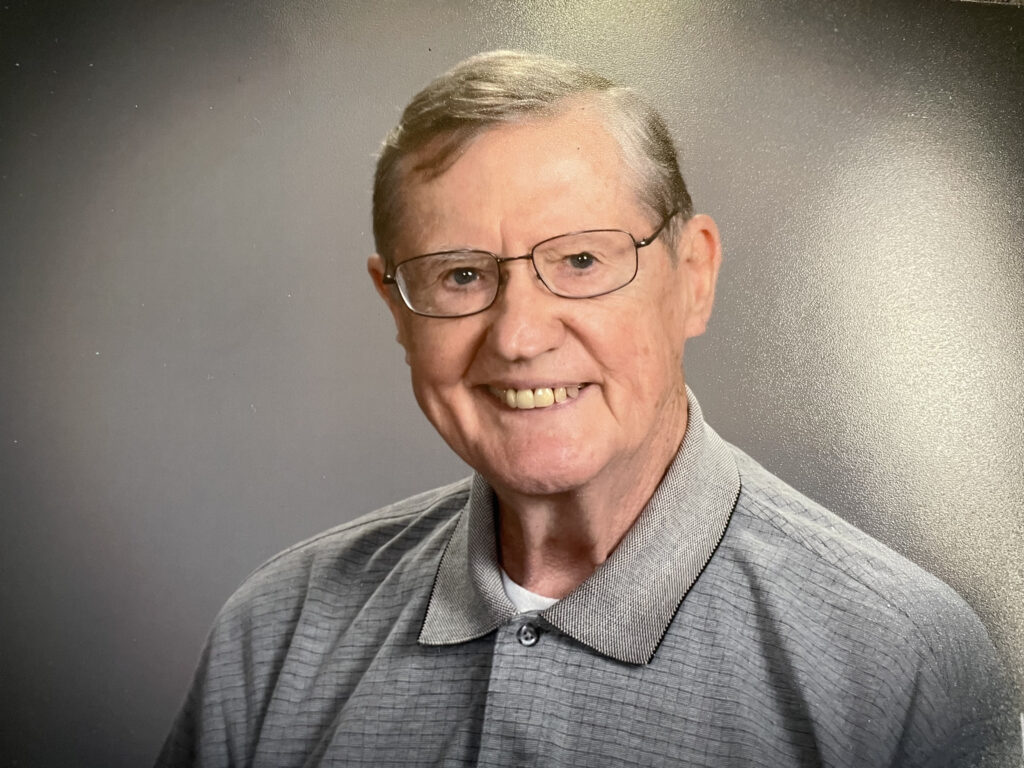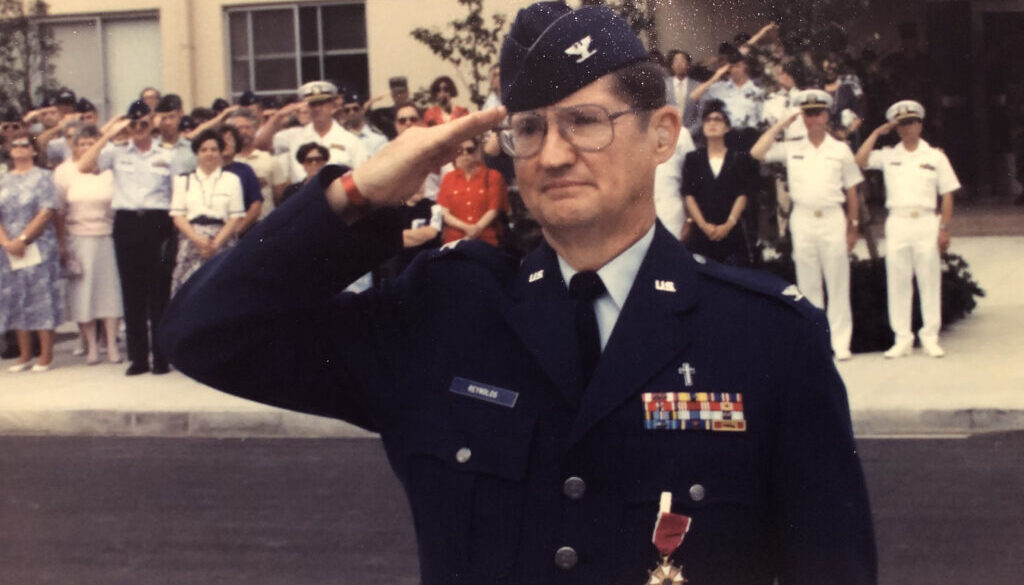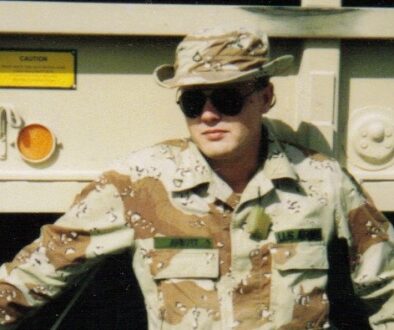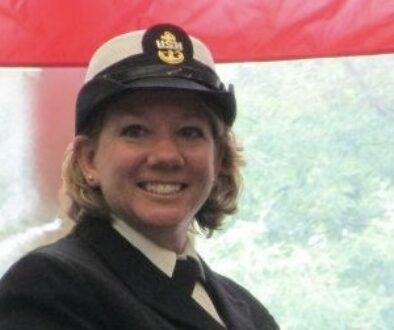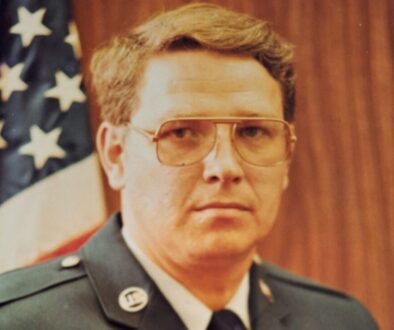Chaplain, Colonel, Marion Reynolds, U.S. Air Force (Ret.) – Faithfully Serving Those Who Serve
Long deployments, work with nuclear weapons, the burden of killing or being killed, and a host of other factors combine to place unique pressures on military members. Fortunately, people like Chaplain, Colonel, Marion Reynolds, Chaplain Service, U.S. Air Force (Retired), feel called by their faith in God to help military members and their families cope with their stress. After serving five years as an enlisted airman, Marion served for twenty-three years as a chaplain, reaching out to airmen where they needed him most. He met with them at the alert facility as they waited for orders on what could be one-way missions. He spoke to them in silos with nuclear-equipped missiles standing at the ready just a few feet away. He consoled them at isolated duty stations around the world whenever they received bad news from home. And, most importantly, he walked in their shoes.
Marion was born in Louisville, Kentucky, in December 1937. His parents divorced when he was five, beginning a series of moves to multiple states he and his younger brother would make over the next ten years as they alternated living with their mother, their father, and other relatives. When Marion was nine, he went to live with his Great Aunt Nellie. She was a very religious person, and she had a profound effect on him. So much so that when Marion turned ten, he was baptized at the Carlisle Avenue Baptist Church in Louisville. He then went to live in Vincennes, Indiana, with his father, stepmother, and their two boys after they returned from working in Europe.
When Marion’s father took a job with the Wabash River Ordnance Works, the family moved to Dana, Indiana, a small town close to the Illinois border. Marion attended his first two years of high school at Dana High before his family moved to Joliet, Illinois, after his dad received a promotion. Marion spent his junior year at Lockport High School in Joliet and, after moving to Plainfield, Illinois, attended Plainfield High School his senior year. Given all the moves, Marion had no time to participate in organized high school activities, but he did manage to hold down a job at a local grocery store during his senior year.
One thing Marion did have time for was his love of aviation. Ever since he was a little boy, he was fascinated by airplanes. He built models with his dad, helping cement their bond. As Marion grew older, his love of aviation turned into a desire to enlist in the Air Force. By the time he graduated from Plainfield High in the spring of 1956, his desire to enlist had become his plan. He spent the summer with his mother and then signed up with the Air Force in October.
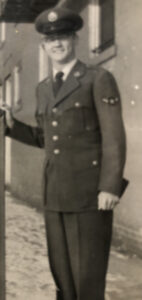
Marion’s Air Force experience began at the Armed Forces Examining and Entrance Station in Chicago. After examinations proved he was physically and mentally qualified to serve and he took the oath of enlistment, he boarded a train for basic training at Lackland Air Force Base in San Antonio, Texas. Although he did well at the training, the aspect of his time at Lackland that affected him most was his interaction with the chaplains. The interaction began when he attended services at the base chapel on Sundays and expanded to other chapel-sponsored events as the weeks went on. The experience reinforced the interest his Great Aunt Nellie began when he was nine years old.
After graduating from basic training, Marion transferred to March Air Force Base outside of Riverside, California. Based on aptitude tests, he had been selected to work in a classified program with the Air Force intelligence community. He spent nine months at March learning his new trade, but, again, the most significant impact came from his participation in base chapel activities, including a single airman’s group. In fact, the impact was so strong, Marion felt called to become an Air Force chaplain.
As Marion’s training drew to a close, it came time to see where the Air Force would send him to put his new skills to use. The program he trained for offered two alternatives: at a base in Germany or at Fort Meade, Maryland. Fort Meade had several advantages if Marion were to pursue becoming a chaplain. First, his uncle was a pastor at a church about seventy miles south of Fort Meade, so Marion could learn what being a pastor entailed by visiting on weekends. Second, he could take on-base evening classes at the University of Maryland to begin fulfilling the educational prerequisites he needed to become a chaplain.
Not knowing which assignment he would get, Marion told himself if his orders were for Fort Meade, that was a clear sign from God he should pursue his dream of becoming a chaplain. Several days before his scheduled departure, he received his orders—he was on his way to Germany. Initially wondering if this meant he was mistaken in his sense of calling, he gradually determined he was still being called to the chaplaincy but would need to satisfy the educational requirements some other way. Then, he and the other airmen heading to Europe boarded a bus to go to the base clinic to get the shots they needed for their assignments overseas. As the bus started rolling, a sergeant ran after the bus and got it to stop. He climbed aboard and announced orders had been changed for ten people, including Marion. He was now on his way to Fort Meade.
Marion arrived at Fort Meade in November 1957. He stayed there for almost four years working on the classified program he’d trained for and promoting to senior airman. He lived in the barracks and, as per his plan, completed two years of college at the University of Maryland. He also visited his uncle’s church on weekends. During one such visit, his uncle introduced him to a young woman they had seen walking across the parking lot while they were talking on the church’s front porch. The woman’s name was Nancy, and she and Marion were married two years later in June 1960.
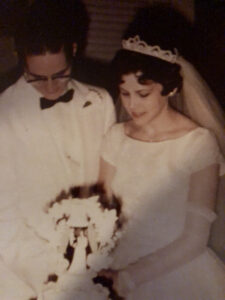
Ready to pursue his calling in earnest, Marion was discharged from active duty in June 1961. He and Nancy moved to Moline, Illinois, so Marion could complete his bachelor’s degree in history at Augustana College in Rock Island, Illinois. Marion specifically picked Augustana because it was a Lutheran school and he wanted to diversify his religious background knowing that once he became a military chaplain, he would be responsible for ministering to servicemembers of all faiths. To keep food on the table, he sold life insurance and worked at the college’s power plant on the 5:00 p.m. to midnight shift. Nancy worked, too, as a certified practical nurse. She also gave birth to their first daughter, Leslie, while Marion was enrolled at Augustana.
After graduating from Augustana College in the spring of 1963, Marion and his family moved to Louisville so Marion could attend the Southern Baptist Theological Seminary. Being back in Louisville allowed him to spend time with Great Aunt Nellie, who was immensely proud her tutelage of nine-year-old Marion had helped turn him into a pastor. Nancy also gave birth to their second daughter, Lauren, during Marion’s time at the seminary.
Marion graduated from seminary in January 1967. He’d already been serving for a year as the pastor of Swallowfield Baptist Church, a small, rural church about sixty miles from Louisville. He worked there on weekends both before and after graduation until he had sufficient pastoral experience to apply to become a military chaplain. After graduation, he moved to Frankfurt to better serve the church. He also worked for the Kentucky Department of Public Assistance, providing him with a steady paycheck. Then, in August 1968, after receiving an endorsement from the Southern Baptist Convention Chaplain’s Commission, Marion got the news he’d been waiting for—he’d been accepted into the Air Force chaplain’s program. He commissioned as a 1st lieutenant that same month and promoted to captain when he came on active duty on November 12.
Although Marion hoped his first assignment would be in Florida near where his mother lived, the Air Force sent him in the opposite direction to Grand Forks Air Force Base in North Dakota. After his previous service, Marion felt like he was coming home when he stepped foot on the base, which served bomber, fighter, tanker, helicopter, and missile squadrons. Others recognized his enlisted experience, too. On Marion’s second day on the base, a first sergeant asked him if he was prior enlisted. When Marion, now a captain, said yes, the first sergeant said, “I thought so when I saw you salute a 2nd lieutenant.”
Marion was one of six chaplains serving on the base. His responsibilities included conducting services at the chapel, counseling airmen and their families, and visiting people at the hospital and other units on base. He also routinely visited the flight line and the alert stations late at night, talking to the aircrews waiting to see if they would get a call to fly a mission in the event of an attack from the Soviet Union. When they were on alert, the aircrews were isolated from their families with nothing to do but think about the possibility of being involved in a nuclear war. Marion’s late-night visits provided a welcome respite from their isolation, boredom, and fear.
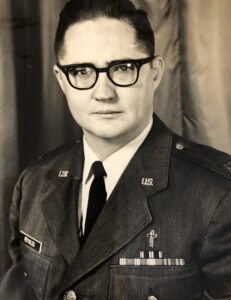
Grand Forks’ winters were notoriously long and cold. During one of his conversations with an airman on alert, Marion asked what summers were like in Grand Forks. The airman replied, “I’m sorry, I can’t tell you. I slept in that day.” Despite living through two Grand Forks’ winters, Marion and his family had a wonderful time there. When it came time to transfer in the summer of 1970, Marion received orders to Kunsan Air Base, located about 110 miles south of Seoul, South Korea. Because the assignment would last only one year, the tour was unaccompanied. This meant Nancy and the girls would have to remain stateside. Although this was difficult for Marion, everyone assigned to Kunsan Air Base was in the same situation. Accordingly, Marion could relate to what they were experiencing. And, like everyone else at Kunsan, he also felt the constant stress of being so close to North Korea, which could invade its southern neighbor at any time without provocation or warning.
Marion served at the Kunsan Air Base chapel conducting services on Sundays and providing religious education to the base community. Since the chapel was at one end of the base and all the base offices were at the other end, the chaplains used a vehicle to meet with airmen in their workspaces. This worked well until an Inspector General (IG) team visited and needed vehicles, so the chapel had to give its up. To remedy the situation, the base commander let the chaplains go to the base’s junkyard and salvage an old van that had nothing in it but a driver’s seat and an open cargo space behind it. Marion and the other chaplains outfitted the van with two easy chairs. After collecting sandwiches and hot chocolate from the chow hall, they, together with the base security supervisor, drove it to the men standing watch at the guard posts around the base perimeter. At each post, the security supervisor relieved the sentry and his guard dog and stood their watch while the sentry sat in an easy chair enjoying a sandwich, hot chocolate, and friendly conversation. Once warmed in the van, both the sentry and his guard dog returned to their post.
The van proved an instant success until the IG departed and the chapel had to give it up. When the IG team heard about it after their departure, they recommended in their report that the chapel be given a new van, which it was. The only catch was the chapel had to share it with the commander of the 5th Air Force, who used the van to change uniforms in whenever he flew from his headquarters to Kunsan. Fortunately, the 5th Air Force commander only used the van once. The new van even had a sign on its sides, “Chaplain Mobile Office,” and a cross on the grill, both of which were removed when the 5th Air Force commander used the van. Working out of the Chaplain Mobile Office was one of the highlights of Marion’s tour.
Another highlight included the great relationships Marion forged with his fellow chaplains. This often played out in pranks, like the time Marion and a Catholic chaplain attached a Korean firecracker, which would detonate when strings at each end were pulled, to the toilet in their shared living facility. When the senior chaplain later raised the toilet seat, the firecracker exploded harmlessly but with a big boom. Later, when the Catholic chaplain went to take his shower in the same bathroom, he found the hot water knob missing and the bathroom window open, flooding the room with icy cold winter air. The pranks kept morale high and helped the men deal with the separation from their families.
The chaplains also helped others deal with being far from home. They always parked their Mobile Chaplain Office near the mail room after the mail plane arrived, knowing not a day would go by without someone receiving bad news. Marion and the other chaplains were there to listen and to console the recipient, hoping to make the hurt less painful.
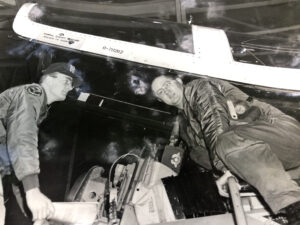
Marion’s tour at Kunsan Air Base ended in the summer of 1971. He transferred to Moody Air Force Base in Valdosta, Georgia, where Nancy and their two girls joined him. Marion was one of four chaplains serving at the chapel there. One of his duties—and for all chaplains worldwide wherever assigned—was to assist in making casualty notifications to deceased servicemembers’ families. One late, rainy night, Marion accompanied a unit commander to notify the elderly parents of an officer that their son’s plane had been shot down in Vietnam and that he had been killed. Although the commander conveyed the horrible news, Marion provided comfort and support, not only to the parents, but also to the commander on the way to and from the notification. Always gut-wrenching, casualty notifications such as this were an essential part of Marion’s duties throughout his career.
Marion spent three years at Moody before receiving orders to be the lone chaplain at Morón Air Base in southern Spain. The base, which had the third longest runway in Europe and served as an alternate space shuttle landing site, was inactive but in a caretaker status in case U.S. military dependents or civilians from other places Europe needed a safe haven to escape a natural or man-made disaster.
Marion and his chaplain’s assistant ministered to the roughly 260 people maintaining the base’s buildings and runways and to the sailors operating a Navy communications facility on Morón. Nancy and their two daughters were also there, as were the families of all the base employees. All went well until it came time for Marion and Nancy’s oldest daughter to leave the on-base grade school to go to middle school. The only available option was a boarding school many hours away in Zaragoza, which Marion and Nancy considered no option at all. Accordingly, Nancy started home schooling their daughter, and she was soon joined by other students studying in the chapel library. Although it worked out in the end, reaching the resolution was stressful.
In March 1976, when people in the United States were celebrating the bicentennial, Marion organized a bus trip from Morón to the Friary of La Rábida in Palos de la Frontera, Spain. Christopher Columbus stayed at the Friary during his efforts to convince King Ferdinand and Queen Isabella to finance his first expedition to the New World. The Friary had on display containers with soil and the flags from every country in the Americas. The U.S. flag, however, was stained and ragged, so after the trip, Marion contacted the U.S. consulate in Seville. The result was a second visit to the Friary, this time with a representative from the consulate, to present a new American flag for the display. Afterwards, Marion and the representative celebrated with a meal together with their Spanish hosts.
With Morón Air Base already in a caretaker status, it came as no surprise when the Air Force downgraded the manning at the base so that it no longer included a chaplain. As a result, Marion transferred in the summer of 1977 to Davis-Monthan Air Force Base in Tucson, Arizona, promoting to major enroute. Although the base’s main mission involved flight training for the A-10 “Warthog” attack aircraft, Marion worked primarily with the missile and spotter plane commands. He also visited the airmen manning the Titan II nuclear missile silos located on base because they worked twenty-four-hour shifts and were isolated underground behind massive blast doors. Marion’s talks with the airmen helped them deal with their isolation and their immense responsibility. Marion and his family loved living in Tucson and spent four years there.
In 1981, Marion reported to his next assignment as the base chaplain at Albrook Air Force Station, located in the Panama Canal Zone on the east side of the canal. As the base chaplain, he was responsible for all chapel operations, including all assigned personnel. He and his family enjoyed their time living in Panama’s tropical climate. Adding to the enjoyment, Marion promoted to lieutenant colonel while there.
After three years in Panama, Marion received orders to attend the prestigious Air War College at Maxwell Air Force Base in Montgomery, Alabama. One of only two Air Force chaplains selected to attend, Marion participated in the course along with Air Force rising stars who would lead the service into the future. Working with them side-by-side for a year, Marion conveyed a realistic and positive view of how chaplains could help them accomplish their missions. Similarly, Marion learned about the other class members’ warfare areas and concerns, giving him a strategic view of his own responsibilities. The class also introduced Marion to civilian and military leaders at the national level during trips to Washington, D.C., where he visited the Pentagon, Supreme Court, and Congress. International class members with an entirely new set of experiences further broadened Marion’s perspective. In return, the class offered Marion the opportunity to minister to his classmates.
Marion graduated from the Air War College in the spring of 1985 and transferred to Norton Air Force Base in California to be part of the Air Force IG team of inspectors. His IG responsibilities took him to Air Force facilities around the world, where he helped evaluate and improve their religious programs by making recommendations based on regulatory requirements and his many years of personal experience. One of four chaplains on the IG team, Marion’s philosophy was to help the base religious programs solve problems and improve their effectiveness. Because those being inspected appreciated Marion’s attitude and help, he enjoyed his tour with the Air Force IG.
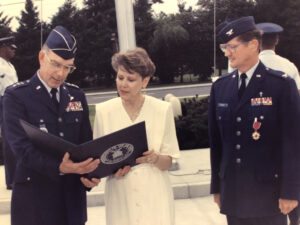
In the summer of 1987, it came time to transfer again. This time Marion went to the Air Force Academy in Colorado Springs, Colorado. He and Nancy, now empty-nesters, lived in a wonderful three-bedroom on-base house, fully immersing them in the academy experience. Now a full colonel, Marion was responsible for the Community Center Chapel, which provided religious support to everyone living or working at the academy except cadets. He still dealt with the cadets during their orientation program and when he and Nancy sponsored individual cadets to give them a substitute family away from home. He also conducted the Christmas Eve service at the Air Force Academy Chapel, which members of the local community were invited to attend.
Marion transferred to his final duty station, the 5th Air Force headquarters at Yokota Air Base in Japan, during the summer of 1989. His boss was the three-star general commanding all forward deployed Air Force units in Japan. Marion, in turn, was responsible for supporting all the chaplains assigned to Air Force bases in Japan. This required him to periodically travel to other Air Force installations to meet with the base chaplains and to ensure they had what they needed to get their jobs done. He also initiated quarterly meetings with civilian missionaries serving in the greater Tokyo area, recruiting and preparing them to assist with the response in the event the base ever suffered a mass casualty event.
While he was at Yokota, Marion required surgery on his nose. Doctors at the Naval Hospital in Yokosuka, Japan, performed the surgery. While he was recuperating, Marion met a Navy corpsman who told him his father had been an Air Force chaplain. Marion asked the sailor his name and he said it was King. As it turned out, Chaplain King had ministered to Marion when he was an enlisted recruit at basic training, influencing him to become a chaplain himself. Marion had also crossed paths with Chaplain King years before during a trip to Kadena Air Base in Okinawa. Meeting Chaplain King’s son was a full circle moment for Marion, connecting the beginning of his Air Force career with the end.
Another notable moment occurred when Marion and Nancy attended a Christmas party hosted by a command doing classified work like the program Marion was involved in when he was an enlisted airman. As part of the festivities, the unit held a drawing to present a five-foot stuffed teddy bear to the lucky winner. The unit’s commanding officer took advantage of Marion’s presence and announced, “To avoid any suspicion about the drawing process, we have asked Chaplain Reynolds to draw the winning name.” Marion did as instructed and, unbelievably, pulled Nancy’s name from the hat. For many years thereafter, the teddy bear lived with Marion and Nancy, guarding their spare bathroom.
Marion retired at Yokota Air Base in February 1992. The 5th Air Force Commander honored him with a formal parade and retirement ceremony. One of the officers making remarks at the ceremony was a chaplain who had been a B-52 navigator Marion visited in the alert shack at Grand Forks Air Force Base over twenty years before. In addition, the officer who served as the Commander of the Troops was the son of a master sergeant Marion served with at Kunsan Air Base. The events were a fitting salute to Marion’s distinguished twenty-eight-year career.
After retiring from the Air Force, Marion and Nancy returned to Arkansas to begin the next chapter of their lives. Two years later, Marion became the Chaplain Coordinator for the Arkansas Baptist State Convention. He was responsible for coordinating with the Convention’s 300 chaplains serving in active duty, reserve, and National Guard military units and throughout the state in such places as hospitals, prisons, fire departments, and police departments. He continued in the position until September 2012, when he began working weekends as a hospital chaplain in North Little Rock. He stayed in that position until it was eliminated and has been volunteering ever since in the hospital’s rehabilitation unit. The hospital badge he wears identifies him not only as a volunteer, but also as a retired military member. When veterans see that on his badge, it immediately breaks down barriers and allows Marion to better encourage them in their recovery.
Voices to Veterans is proud to salute Chaplain Marion Reynolds for his long and distinguished career in the Air Force. Often assigned to remote areas, he went out of his way to bring comfort and a touch of home to military members dealing with isolation and life’s many challenges. His service took him across the globe to three continents, ministering to others and helping them cope with their important military responsibilities. We thank him for all he has done, and for all he continues to do for those recovering from injury or illness, and wish him fair winds and following seas.
If you enjoyed Marion’s story, please sign up for the Voices to Veterans Spotlight monthly newsletter by clicking here. Once each month, you’ll receive a new written veteran’s story directly in your mailbox. Best of all, it’s free and you can unsubscribe at any time.
